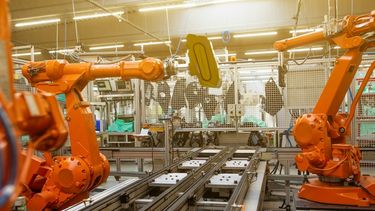Part of UK Research and Innovation’s ‘Manufacturing research hubs for a sustainable future’ programme, the hub has received £34.6M (£11M from EPSRC and £23.6M from project partners) in funding over the next 7 years. It will be named the EPSRC Manufacturing Research Hub in Robotics, Automation & Smart Machine Enabled Sustainable Circular Manufacturing & Materials (RESCu-M2) and will focus on two grand challenges: transforming the sustainable use of critical materials, and improving the productivity of ‘Re-X’ manufacturing processes.
So-called Re-X processes include reuse, repurpose, repair, remanufacture and recycle. These processes are currently much more labour-intensive than traditional manufacturing, resulting in many materials being disposed of via landfill or incineration. However businesses could save up to £23bn per year by making low- or no- cost improvements.
Announcing the funding, EPSRC Executive Chair Professor Charlotte Deane said: “Given the scale and importance of the UK’s manufacturing sector we must ensure that it is able to benefit fully from advances made across the research and innovation ecosystem.
“With their focus on innovation and sustainability the advances made by the hubs will benefit specific sectors, the wider manufacturing sector and economy, as well the environment”
Science Minister, Andrew Griffith said: “Manufacturing accounts for almost a tenth of the UK’s economic output, but for the sector to keep growing and sustaining jobs nationwide, it has to tackle challenges ranging from reducing emissions, to cutting production costs.
“These new hubs will support UK researchers with the cutting-edge facilities they need, to help our manufacturers seize the benefits of technologies such as robotics and AI. Harnessing these innovations will cement the UK's position as a global leader in sustainable manufacturing."
The RESCu-M2 hub is to be established by the University of Birmingham and aims to harness advances in AI and intelligent automation to create a new manufacturing ecosystem that can promote cost-effective circular resource use.
Partners include the Universities of Strathclyde, Leeds, 91÷±≤• and Brighton, as well as Loughborough University, the Manufacturing Technology Centre, West Midlands Combined Authority, West Yorkshire Combined Authority, Brighton & Hove Chamber of Commerce and Atom‚ÄØValley‚ÄØwith Rochdale Development Agency. These partners will support the development of ‚Äòspokes‚Äô from the hub, around which opportunities for further investment can emerge.
Our research at the University of 91÷±≤• will contribute to the Hub Grand Challenge of radically improving productivity of Re-X manufacturing processes on par with or exceeding traditional forward manufacturing processes. Re-X includes re-use, repair, refurbishment, remanufacturing and recycling. We will lead the Hub research activities in cyber-physical inspection, sensing and analysis for real-time assessments throughout a product's lifecycle and at its end-of-life stage to predict remaining useful life and ensure optimal Re-X routing. We will develop a unified Digital Passport framework to capture and process product lifecycle data providing insights into a product's history and a novel Re-X virtual environment for linking the Digital Passport with real-time sensor data. Our research at 91÷±≤• will be grounded and validated by industry flagships, such as large engineering structures, where Re-X processes are needed to meet sustainability and productivity goals.
We are really excited to be part of this Hub. The transformative manufacturing ecosystem, as envisioned by the Hub, will enable circular utilisation of high-value products through leveraging groundbreaking advancements in digital manufacturing, AI and smart machines. We at the University of 91÷±≤• look forward to developing new digital manufacturing techniques, in collaboration with our industry partners, to tackle the productivity challenges associated with key Re-X processes.
Professor Ashutosh Tiwari FREng, leading the Hub work at 91÷±≤•
Deputy Vice-President for Innovation at 91÷±≤• and Airbus/RAEng Chair in Digital Manufacturing in ACSE
Professor Samia Nefti-Meziani OBE, Director of the Birmingham Robotics Institute, is the Hub director. She said: “We need to adopt radical new approaches in manufacturing that move away from a focus on producing new products, and then disposing of them when they reach their ‘end of life’.
“Instead, we should be focusing on processes that prolong the useful life of products, particularly those including critical materials such as rare earth elements.
The environmental impact from the global consumption of engineering materials is expected to double in the next forty years, while annual waste generation is projected to increase by 70% by 2050. The funding from UKRI is designed to set out the circular economy requirements and sustainability goals set out by the UK Government.
The hub brings together an interdisciplinary team, including experts in manufacturing, robotics, AI and automation, materials science, chemical engineering, chemistry, economics and life cycle assessment. It will focus initially on four flagship areas: energy, medical devices, electric drives and large structures.
Researchers will investigate:
- Smart processes for disassembly, remanufacturing, separation, and recovery of critical products, components, and ultimately materials.
- Sensing and analysis processes to track and determine the state of critical materials throughout their life.
- Design methodologies for circular manufacturing.
- Testing and validation methods to certify the remaining useful life of crucial products, components, and materials.
- Circular Re-X business models.

